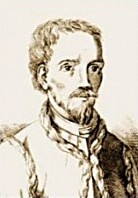Franco Sacchetti: Difference between revisions
Undid revision 355774615 by 87.28.126.85 (talk) Rv sock |
|||
| Line 1: | Line 1: | ||
[[Image:Franco Sacchetti.jpg|right|frame|Franco Sacchetti.]] |
[[Image:Franco Sacchetti.jpg|right|frame|Franco Sacchetti.]] |
||
'''Franco Sacchetti''', |
'''Franco Sacchetti''', (c. 1335 – c. 1400), was an [[Italy|Italian]] poet and novelist born in the [[Republic of Ragusa]] ([[Dubrovnik]]). |
||
He was the son of Benci di Uguccione, surnamed Buono, of the noble and ancient Florentine family of the Sacchetti and was born in [[Dubrovnik]], [[Dalmatia]] or in [[Florence]][http://www.britannica.com/EBchecked/topic/515218/Franco-Sacchetti#tab=active~checked%2Citems~checked&title=Franco%20Sacchetti%20--%20Britannica%20Online%20Encyclopedia] about the year 1335. While still a young man he achieved repute as a poet, and he appears to have traveled on affairs of more or less importance as far as to [[Genoa]], [[Milan]] and [[Ischiavonia]]. When a sentence of banishment was passed upon the rest of the house of Sacchetti by the Florentine authorities in 1380 it appears that Franco was expressly exempted, ''per esser tanto uomo buono'' ("because he is a real good man"), and in 1383 he was one of the eight, discharging the office of prior for the months of March and April. |
He was the son of Benci di Uguccione, surnamed Buono, of the noble and ancient Florentine family of the Sacchetti and was born in [[Dubrovnik]], [[Dalmatia]] or in [[Florence]][http://www.britannica.com/EBchecked/topic/515218/Franco-Sacchetti#tab=active~checked%2Citems~checked&title=Franco%20Sacchetti%20--%20Britannica%20Online%20Encyclopedia] about the year 1335. While still a young man he achieved repute as a poet, and he appears to have traveled on affairs of more or less importance as far as to [[Genoa]], [[Milan]] and [[Ischiavonia]]. When a sentence of banishment was passed upon the rest of the house of Sacchetti by the Florentine authorities in 1380 it appears that Franco was expressly exempted, ''per esser tanto uomo buono'' ("because he is a real good man"), and in 1383 he was one of the eight, discharging the office of prior for the months of March and April. |
||
| Line 11: | Line 11: | ||
==See also== |
==See also== |
||
* [[Republic of Dubrovnik]] |
|||
* [[List of notable Ragusans]] |
* [[List of notable Ragusans]] |
||
Revision as of 16:07, 13 April 2010

Franco Sacchetti, (c. 1335 – c. 1400), was an Italian poet and novelist born in the Republic of Ragusa (Dubrovnik).
He was the son of Benci di Uguccione, surnamed Buono, of the noble and ancient Florentine family of the Sacchetti and was born in Dubrovnik, Dalmatia or in Florence[1] about the year 1335. While still a young man he achieved repute as a poet, and he appears to have traveled on affairs of more or less importance as far as to Genoa, Milan and Ischiavonia. When a sentence of banishment was passed upon the rest of the house of Sacchetti by the Florentine authorities in 1380 it appears that Franco was expressly exempted, per esser tanto uomo buono ("because he is a real good man"), and in 1383 he was one of the eight, discharging the office of prior for the months of March and April.
In 1386 he was chosen ambassador to Genoa, but preferred to go as podestà to Bibbiena in Casentino. In 1392 he was podestà of San Miniato, and in 1396 he held a similar office at Faenza. In 1398 he received from his fellow-citizens the post of captain of their then province of Romagna, having his residence at Portico. The date of his death is unknown; most probably it occurred about 1400, though some writers place it as late as 1410.
He wrote sonnets, canzoni, madrigals, and other poems; his best known works are however his Novelle (short stories). They were originally 300 in number, but today only 258 remain, the rest having been lost. They were not fitted into any framework like that of Boccaccio's Decameron. The best of them are of a humorous character; and their style is more simple and colloquial than Boccaccio's. The story given as a specimen probably exists (under one form or another) in the folk tales of every European nation.
See also
References
- Werner, A. The Humour of Italy. London: W. Scott Ltd.
- This article incorporates text from a publication now in the public domain: Chisholm, Hugh, ed. (1911). Encyclopædia Britannica (11th ed.). Cambridge University Press.
{{cite encyclopedia}}: Missing or empty|title=(help)
